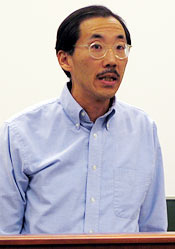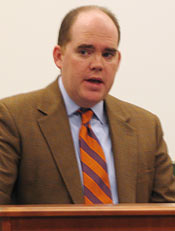Congressional Democrats May Shift Tax Policy, Say Yin, Doran
Posted Nov. 17, 2006

Professor George Yin
A Democratic Congress will likely make changes in tax policy a high priority, said two Virginia tax law professors who are former Washington insiders, at an event sponsored by the Virginia Tax Review journal Nov. 8 at the Law School.
“This is pretty much what you’d expect given that the Democrats have been out of control for a dozen years,” said George Yin, who returned to the Law School in January after a stint as chief of staff to Congress’s Joint Committee on Taxation. “There’s a lot of pent-up interest since their priorities haven’t been satisfied. Proposals to favor broadband, alternative fuels, tuition deductions, R&D, health care for small businesses, savings for low-income activities and a number of other things will come out, continuing the practice of the Clinton and Bush administrations where government spending through the tax system is ok.”
Yin said that one of the likely priorities of the Democratic majority will be to address the Alternative Minimum Tax, or AMT. This tax, originally created in order to ensure that the very wealthy cannot escape paying taxes completely, is not indexed to inflation and is creeping into the middle class. Yin said that the AMT “would essentially create a tax increase on a number of middle-class taxpayers if no changes are made. It primarily affects middle-class taxpayers in Democratic states, so Democrats have a large interest in doing something about that.”
Yin said that a major policy issue that Democrats will need to address is how to pay for any changes to the tax system. For example, just putting in a one-year fix for the AMT costs between $40 and $50 billion, he said. Democrats campaigned on ending tax giveaways to big oil and companies that export jobs overseas, but in light of history, Yin expressed skepticism about whether this would be enough to pay for everything Democrats are likely to want to do. Yin noted that, during the 1992 campaign, Bill Clinton asserted that he would end international tax avoidance schemes to raise $45 billion. Clinton fulfilled his promise once elected, but Yin said that the estimated revenue change was $45 million—not billion. “Although the assertion is made, and I’m sure there will be attempts made, to take away tax giveaways to big oil, how successful that will be remains to be seen.”
Yin suggested instead that one solution that might happen is an additional surcharge on very high-income taxpayers—those who earn several hundred thousand or millions. He also said that extending the Bush tax credits would likely be a non-starter, with the exception of the estate tax.
A fundamental overhaul of the tax system, Yin predicted, is a possibility in a Democratic Congress because of a number of factors. For the Bush administration, it would represent an occasion to change the focus from foreign policy problems and seize the offense while offering an area of opportunity for the president’s domestic legacy. For the new Congress, pursuing fundamental reform gives Democrats the chance to achieve reform in a way consistent with the party’s basic principles of fairness and simplicity. It also represents an opportunity for Rep. Charlie Rangel (D-NY), the likely chair of the House Ways and Means Committee. At 76, Rangel is likely to want to seize the chance to govern during his time as that panel’s chair, Yin said.
Finally, in a more immediate sense, Yin predicted that the lame-duck congressional session will be short and uneventful because of the change in party control. “Democrats will not want to make any concessions,” he said. “Congress has to do some appropriations bills in the lame-duck session, but they don’t have to do anything else.”

Professor Michael Doran
Michael Doran, who worked at the U.S. Department of Treasury’s Office of Tax Policy during both the Clinton and George W. Bush administrations, noted that there will likely be a period of adjustment as the Democrats learn to be in the majority again.
“It makes all the difference in the world from the perspective of the executive branch whether the president’s party controls Congress. During the Clinton years, the president’s budget on the Hill was a non-starter,” Doran said, noting that both sides had to agree to make tax policy a priority to obtain congressional action. “When people really wanted to get something done, they could get something done, when divided government was present. If there was an agreement there was going to be a tax bill, there would be a tax bill.”
Doran said that once the initial adjustment period passes and Congress and the White House begin to work together on tax legislation, there will be changes enacted into law. “If history is any guide, it’s not going to slow down the pace of tax legislation at all,” Doran said. “Arguably, there’s reason to think that we’re going to see better outcomes under divided government than we have seen when government has been under control of one party. The Tax Reform Act of 1986, which tax policy people tend to hold up as the high watermark of good policy, occurred with a Republican president and a Democratic Congress. The balanced budget agreements of the 1990s were under divided government.”
Doran said that Social Security reform could also be on the agenda. “The Republicans, ever since the belly flop on private accounts, have been looking for a graceful way to back off private accounts, and now they have it, because they can’t get them through a Democratic House of Representatives,” he noted. “There’s reason to think that the various interest groups and various constituencies that have a stake in fundamental reform on entitlements would be able to pull together under divided government.”
Both Yin and Doran said that Virginia students should consider pursing public service opportunities during their careers. “The decisions that come out of Congress are very important. Whether you like the process or think the process is dysfunctional, the product is important. That alone is reason to consider public service,” Yin said. “If you are, like me, at heart a political junkie, it doesn’t get any better than seeing up close the sausage factory.”
Doran noted that beyond the honor and privilege of being in public service, policy work is very interesting. “My work put me in touch with people in the legislative and executive branches, which is valuable in and of itself. It provides someone who is relatively junior in their career the opportunity to develop a public profile,” Doran said. “You have immediate visibility across the country in your area, and it is very helpful in terms of your own career advancement.”
• Reported By Robin Cook '07
Founded in 1819, the University of Virginia School of Law is the second-oldest continuously operating law school in the nation. Consistently ranked among the top law schools, Virginia is a world-renowned training ground for distinguished lawyers and public servants, instilling in them a commitment to leadership, integrity and community service.


